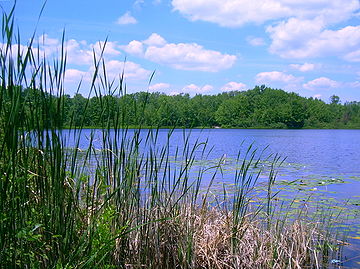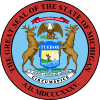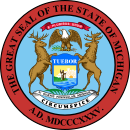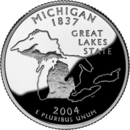The Michigan Portal  Michigan (/ˈmɪʃɪɡən/ MISH-ig-ən) is a state in the Great Lakes region of the Upper Midwest region of the United States. It borders Wisconsin to the southwest in the Upper Peninsula, and Indiana and Ohio to the south in the Lower Peninsula; it is also connected by Lakes Superior, Michigan, Huron, and Erie to Minnesota and Illinois, and the Canadian province of Ontario. With a population of nearly 10.12 million and an area of 96,716 sq mi (250,490 km2), Michigan is the 10th-largest state by population, the 11th-largest by area, and the largest by area east of the Mississippi River. Its capital is Lansing, and its largest city is Detroit. Metro Detroit is among the nation's most populous and largest metropolitan economies. The name derives from a gallicized variant of the original Ojibwe word ᒥᓯᑲᒥ (mishigami), meaning "large water" or "large lake". Michigan consists of two peninsulas. The Lower Peninsula resembles the shape of a mitten, and comprises a majority of the state's land area. The Upper Peninsula (often called "the U.P.") is separated from the Lower Peninsula by the Straits of Mackinac, a five-mile (8 km) channel that joins Lake Huron to Lake Michigan. The Mackinac Bridge connects the peninsulas. Michigan has the longest freshwater coastline of any political subdivision in the United States, being bordered by four of the five Great Lakes and Lake St. Clair. It also has 64,980 inland lakes and ponds. Michigan has the second-most water area of any state, behind only Alaska. The area was first occupied by a succession of Native American tribes over thousands of years. In the 17th century, French explorers claimed it as part of the New France colony, when it was largely inhabited by Indigenous peoples. French and Canadian traders and settlers, Métis, and others migrated to the area, settling largely along the waterways. After France's defeat in the French and Indian War in 1762, the region came under British rule. Britain ceded the territory to the newly independent United States after its defeat in the American Revolutionary War. The area was part of the larger Northwest Territory until 1800, when western Michigan became part of the Indiana Territory. Michigan Territory was formed in 1805, but some of the northern border with Canada was not agreed upon until after the War of 1812. Michigan was admitted into the Union in 1837 as the 26th state, a free one. It soon became an important center of industry and trade in the Great Lakes region, attracting immigrants in the late 19th and early 20th centuries from many European countries. Immigrants from Finland, Macedonia, and the Netherlands were especially numerous. Migration from Appalachia and of Black Southerners as part of the Great Migration increased in the 1930s, with many settling in Metro Detroit. Although Michigan has developed a diverse economy, in the early 20th century it became widely known as the center of the U.S. automotive industry, which developed as a major national economic force. It is home to the country's three major automobile companies (whose headquarters are all in Metro Detroit). Once exploited for logging and mining, today the sparsely populated Upper Peninsula is important for tourism because of its abundance of natural resources. The Lower Peninsula is a center of manufacturing, forestry, agriculture, services, and high-tech industry. (Full article...) Entries here consist of Good and Featured articles, which meet a core set of high editorial standards.
The University of Michigan Men's Glee Club is an all-male glee club (or choir) at the University of Michigan. With roots tracing back to 1859, it is the second oldest glee club in the United States and is the oldest student organization at the university. The club has won the Llangollen International Musical Eisteddfod on four separate occasions. Since 2018, the Club's musical director has been Mark Stover, who has continued to expand the Club's repertoire and arranged performances. The origins of the club stem from a variety of groups that came together in 1876. After a number of years including banjo and mandolin players in the club, it reverted to simply a vocal group by the mid-1920s. It received a substantial rise in profile under the directory of Philip Duey in the 1950s, who organised national, then international tours, and numerous television appearances. Since then, the club has continued to tour internationally at high-profile venues. (Full article...) Selected picture - The Huron-Manistee National Forests are actually two National Forests combined in 1945 for administration purposes and which comprise 978,725 acres (3,960 km2) of public lands, including 5,786 acres (23 km2) of wetlands, extending across the northern Lower Peninsula of Michigan. Did you know -
Related portalsSelected article -Catharine H. T. Avery (née, Tilden; December 13, 1844 - December 22, 1911) was an American author, editor, and educator of the long nineteenth century. Of Revolutionary ancestry and hailing from Michigan, she was founder and regent of the Western Reserve Chapter of the Daughters of the American Revolution (DAR), of Cleveland, Ohio; Vice-president General of its National Society; and editor of the National Society's official organ, the American Monthly. She also served two years as a member of the Cleveland School Board, being the first woman in Ohio chosen to an elective office. After the death of her father in 1861, she moved with her step-mother to Massachusetts. She was educated in the Normal School of that state and taught school in Massachusetts. Soon after the first meeting of the DAR, she became a member of the District of Columbia Society. The first president-general, Caroline Harrison, offered her the state regency of Ohio. She declined, but accepted the regent's commission for the Western Reserve Chapter, which she organized, the first in Ohio. In 1895, she was unanimously elected regent of the state. On retiring from the state regency, she was elected vice president-general from Ohio, and at the expiration of that term, the state bestowed upon her the life title "honorary state regent." From the time she joined the order until her death, 20 years later, she never relaxed her interest or activities in the work of the DAR in Ohio and the U.S. During the last 12 years of her life, she was editor of the American Monthly magazine, the official organ of the national society. Even earlier, she was a generous contributor to the newspapers on subjects which interested her. She was elected to membership in the Cleveland Woman's Press Club, twice serving as its president. She was its delegate to the conventions of the International League of Press Clubs held at Saint Paul, Minnesota and San Francisco, California. Avery was a close friend of Lydia Maria Child and attracted the notice of Wendell Phillips. (Full article...) Selected biography -George Wilcken Romney (July 8, 1907 – July 26, 1995) was an American businessman and politician. A member of the Republican Party, he served as chairman and president of American Motors Corporation from 1954 to 1962, the 43rd governor of Michigan from 1963 to 1969, and 3rd secretary of Housing and Urban Development from 1969 to 1973. He was the father of Mitt Romney, who serves as one of the United States senators from Utah and formerly was a governor of Massachusetts and the 2012 Republican presidential nominee; the husband of 1970 U.S. Senate candidate Lenore Romney; and the paternal grandfather of former Republican National Committee chair Ronna McDaniel. Romney was born to American parents living in the Mormon colonies in Mexico; events during the Mexican Revolution forced his family to flee back to the United States when he was a child. The family lived in several states and ended up in Salt Lake City, Utah, where they struggled during the Great Depression. Romney worked in a number of jobs, served as a Mormon missionary in the United Kingdom, and attended several colleges in the U.S. but did not graduate from any of them. In 1939, he moved to Detroit and joined the American Automobile Manufacturers Association, where he served as the chief spokesman for the automobile industry during World War II and headed a cooperative arrangement in which companies could share production improvements. He joined Nash-Kelvinator Corporation in 1948, and became the chief executive of its successor, American Motors, in 1954. There he turned around the struggling firm by focusing all efforts on the compact Rambler car. Romney mocked the products of the "Big Three" automakers as "gas-guzzling dinosaurs" and became one of the first high-profile, media-savvy business executives. Devoutly religious, he presided over the Detroit stake of the Church of Jesus Christ of Latter-day Saints. (Full article...) General imagesThe following are images from various Michigan-related articles on Wikipedia.
TopicsCategoriesSymbols
Lists
Related pagesWikimediaThe following Wikimedia Foundation sister projects provide more on this subject:
Things you can doDiscover Wikipedia using portals | ||||||||||||||||||||||||||||||||||||













































































